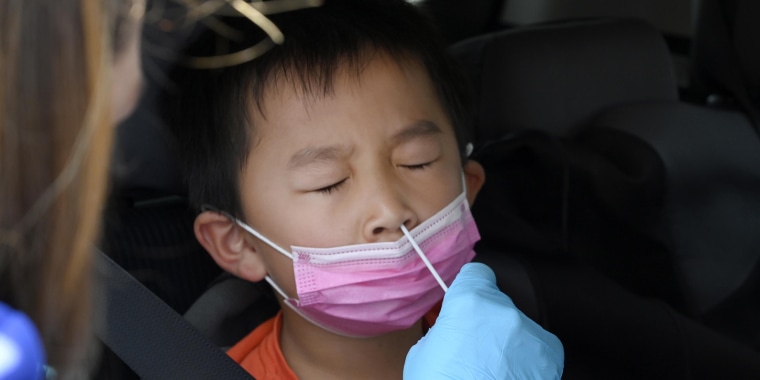Parents of young kids will have to wait just a bit longer for the Pfizer-BioNTech COVID-19 vaccine.
Last week, Pfizer announced interim results for its COVID-19 vaccine trial in kids under 5, but the findings were a bit disappointing: While children under 2 showed the expected level of immune response to two doses, those between the ages of 2 and 5 did not.
Now the company is adjusting its testing protocols to add a third dose of the vaccine for all participants under 5, which will undoubtedly cause a delay in getting the vaccine to young kids. The company will also be testing third doses for children ages 5 and 12, and booster shots were authorized for 16- and 17-year-olds earlier this month.
Keep in mind that the dose for kids in these trials is just 3 micrograms, Dr. William Moss, executive director of the International Vaccine Access Center at the Johns Hopkins Bloomberg School of Public Health, told TODAY. That's a tenth of the 30 microgram dose given to adults and less than half the 10 microgram dose given to 5-to-11-year-olds, said Moss, who was not involved with the trials.
The company originally decided on that dose following a phase 1 trial in the spring, Dr. Simon Li, director of the division of pediatric critical care at Rutgers Robert Wood Johnson School of Medicine, told TODAY. It's not clear yet exactly why the vaccine didn't produce the expected results in 2- to 4-year-olds, but Li and Moss suspect that body weight may have been a factor.
There's a "huge, huge weight difference" between those groups of kids and a "huge difference in the way they're going to respond," said Li, who is leading one of the sites of Pfizer's pediatric clinical trials.
The changing landscape of coronavirus variants may also be playing a role, Li said. Back when the initial phase 1 data was collected, the alpha variant was the predominant strain in areas where the trials were ongoing and delta was just beginning to enter the fray. During the phase 2/3 trial, however, delta took over.
"In my mind, delta is definitely playing a role because the initial studies were done on alpha for the dosing," Li said. “We know that there is definitely reduced efficacy — not a horrible one, but a little bit of a reduction — against delta, and that definitely is playing a part.”
Moss said the issue is much more likely to be related to body mass, however.
Pfizer's decision to add a third dose of the vaccine rather than start again with two larger doses for 2- to 4-year-olds is based on the safety and tolerability profile of the 3 microgram dose for kids in this age group, Kathrin U. Jansen, Pfizer's senior vice president and head of vaccine research and development, said on a call with investors last week.
This approach generally also reflects researchers' evolving understanding that the vaccine requires a "three-dose schedule rather than a two-dose schedule" to be most effective, Moss said.
Another part of the decision may simply be coming out of a need for expediency amid the COVID-19 crisis. "If you were to up the amount, you literally would have to re-recruit a whole new group of (participants)," Li explained. "You would also have to redo your initial phase 1 studies."
Instead, "this is something they can add on to the ongoing trial and not have to re-recruit," Moss explained. "And that helps with the timeline."
Still, the company said there will be a delay. Initially, Pfizer expected to have results by the end of the year and be submitting a request for an FDA authorization shortly after. "If the three-dose study is successful, Pfizer and BioNTech expect to submit data to regulators to support an EUA for children 6 months to under 5 years of age in the first half of 2022," the companies said in a press release.
Meanwhile, Moderna's clinical trial for young kids is still ongoing. Previously, TODAY reported that the company may see its first results for this age group in mid-January and will decide whether or not to pursue an emergency use authorization at that time.

